Myanmar: Military air strikes that killed 17 civilians ‘must be investigated as war crimes’

Air strikes by the Myanmar military killed 17 civilians – including nine children – as they gathered to attend church last month, Amnesty International said in a new investigation.
The strikes, at approximately 10.30am on Sunday 07 January, struck close to Saint Peter Baptist Church in Kanan village in Sagaing region, near the country’s western border with India. More than 20 people were injured.
Witnesses told Amnesty International that two children were killed by the first set of explosions while playing football in front of a nearby school. Many of the other victims were trying to run to safety when the second air strike hit. The attack damaged the church and school, as well as six civilian houses.
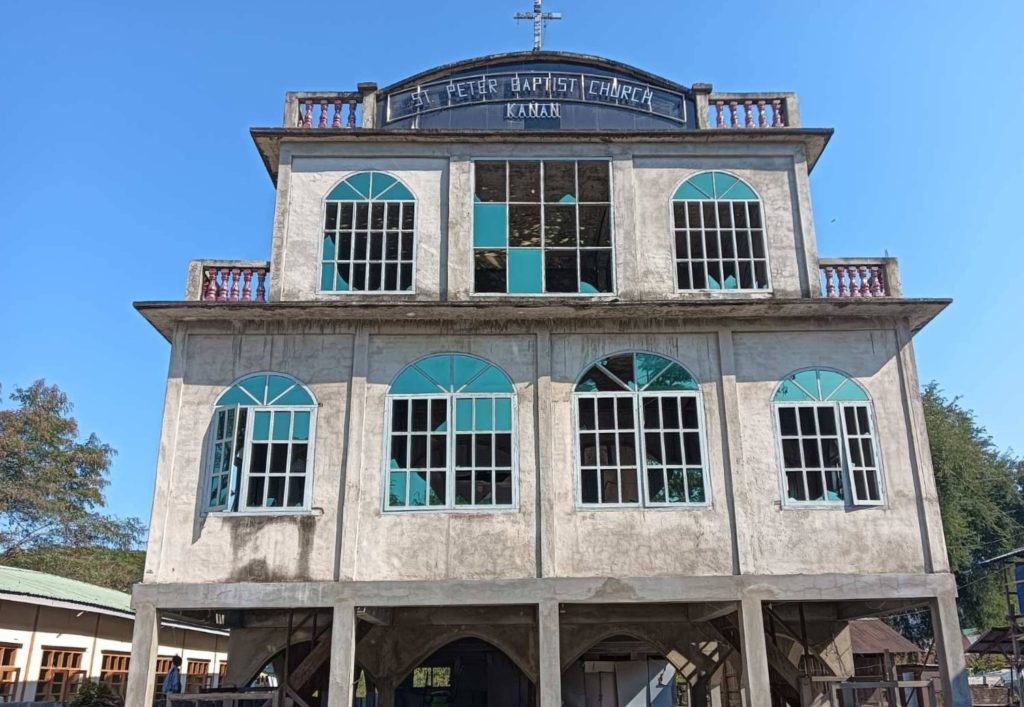
Saint Peter Baptist Church in Kanan was damaged by the air strikes on Sunday 07 January 2024.
“The Myanmar military’s deadly attacks on civilians show no signs of stopping,” said Matt Wells, Director of Amnesty International’s Crisis Response Programme.
“The world cannot continue to look the other way while the Myanmar military relentlessly attacks civilians and civilian targets, including churches, schools and hospitals. Countries and companies around the world must stop the flow of jet fuel to the military, to protect civilians from further catastrophe.
“These attacks must be investigated as war crimes, and the UN Security Council should refer the situation in Myanmar to the International Criminal Court. The perpetrators of these crimes under international law must be brought to justice.”
Amnesty International interviewed four witnesses to the attacks, one person who visited Kanan after the attack and saw the bodies of those killed, and another person with knowledge of military operations in the area. The organization also analysed 99 photos and videos of the strikes and their aftermath, including images of those killed and injured.
All of the structural damage caused to the school, church and nearby homes is consistent with air strikes. The combined photo and video evidence indicates at least three impact locations, with craters consistent with aircraft bombs of approximately 250kg each. Satellite imagery taken after the strike also confirms significant damage to the school, adjacent structures and nearby homes, all consistent with an air strike.
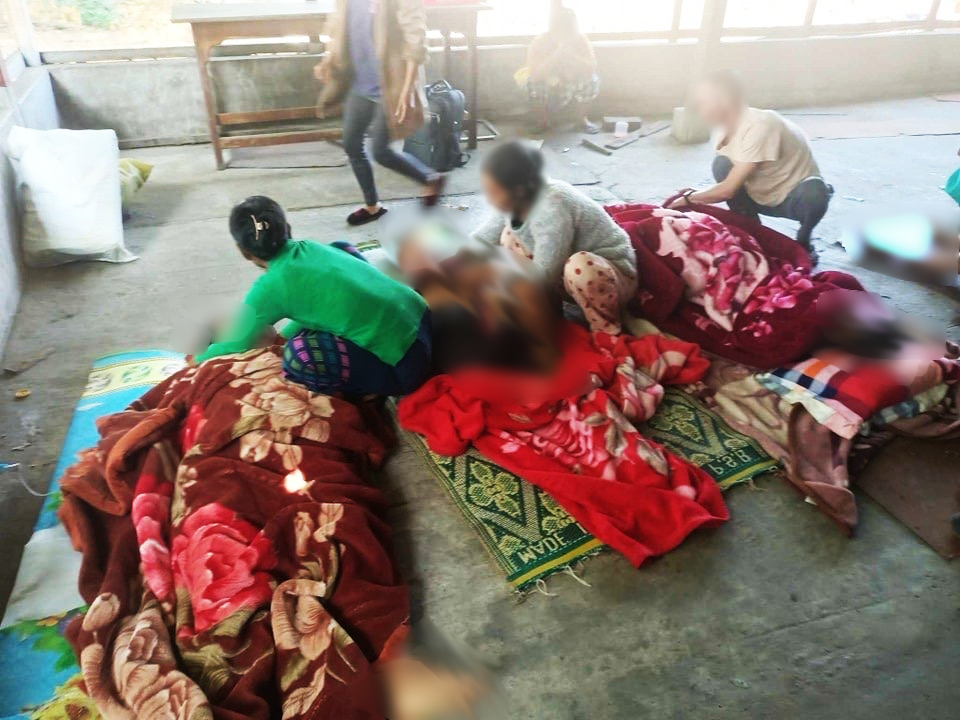
In total, 17 civilians – including nine children – were killed in the strikes.
The Myanmar military has denied responsibility for the attack, claiming no planes were flying in the area that morning. However, Amnesty International reviewed a video taken during the strike which shows the distinctive swept-wing silhouette of an A-5 fighter jet flying over the village. In Myanmar, only the military flies A-5 jets, which were imported from China.
Amnesty International previously documented how the Tada-U military air base, near Mandalay, is often used to launch aircraft in strikes aimed at Sagaing. Satellite imagery of Tada-U, taken shortly before and after the strike, shows active A-5 operations on the airfield. In three separate postings on a group messaging channel reviewed by Amnesty International, flight spotters on the ground indicated they witnessed a fighter jet taking off from Tada-U air base at 10am; an A-5 flying northwest over Kalewa, in the direction of Kanan, at 10.26am; and then an A-5 landing from the northwest at Tada-U at 10.56am. The locations, directions and timings of these observations are all consistent with an attack on Kanan at approximately 10.30am.
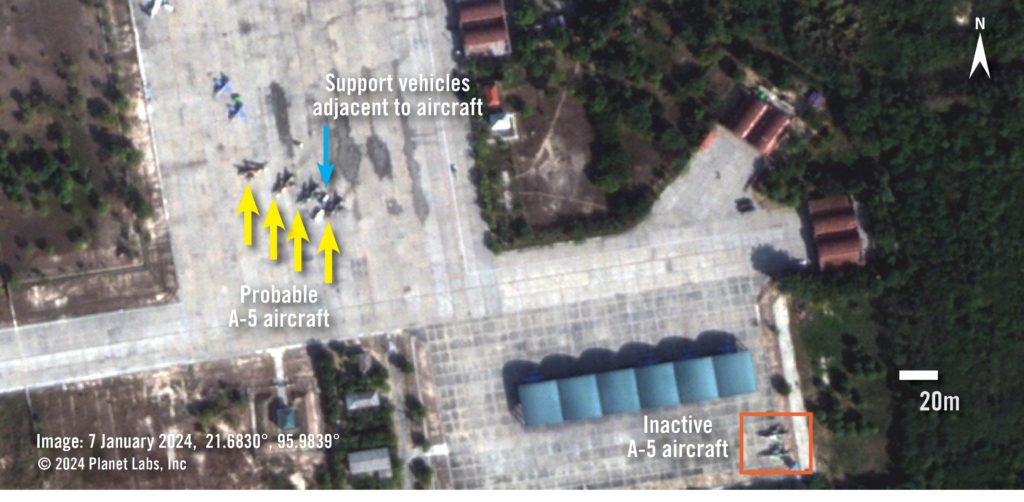
Satellite imagery of Tada-U military air base, taken shortly before and after the strike, shows active A-5 operations on the airfield.
Sources interviewed by Amnesty International said they had been told that members of a local People’s Defense Force (PDF) – one of many local armed groups formed since the coup to oppose the military’s rule – had planned a ceremony at the village school later that day. However, based on consistent witness accounts, fighters do not appear to have been present at the time of the strikes, which killed and injured civilians only.
Even if the military believed there may have been lawful targets present, it dropped several large bombs on a residential area at a time on Sunday when civilians were gathering for church, and struck again as civilians fled in panic. As such, these attacks were indiscriminate at a minimum, and should be investigated as war crimes.
Last week, Amnesty International called again for the sale or transfer of jet fuel to Myanmar to be suspended after its investigation suggested the military were still importing fuel despite sanctions being placed on individuals and companies linked to the supply chain.
‘We can’t sleep when we think about what happened’
The Myanmar military has repeatedly attacked civilians and civilian objects – often destroying or damaging schools, religious buildings and other key infrastructure – in the three years since carrying out a coup.
Kanan – a village of an estimated 7,000 people – is located just north of the town of Khampat in Tamu township. Most of its residents are ethnic Chin, and practice Christianity.
Residents of Kanan said that, prior to these strikes, they had not directly experienced armed conflict since the February 2021 coup. However, on 07 November 2023, a coalition of resistance forces seized Khampat from the military following four days of clashes. The military attempted to retake the town with a series of ground offensives in December, but was unsuccessful and retreated after a week, according to local media reports.
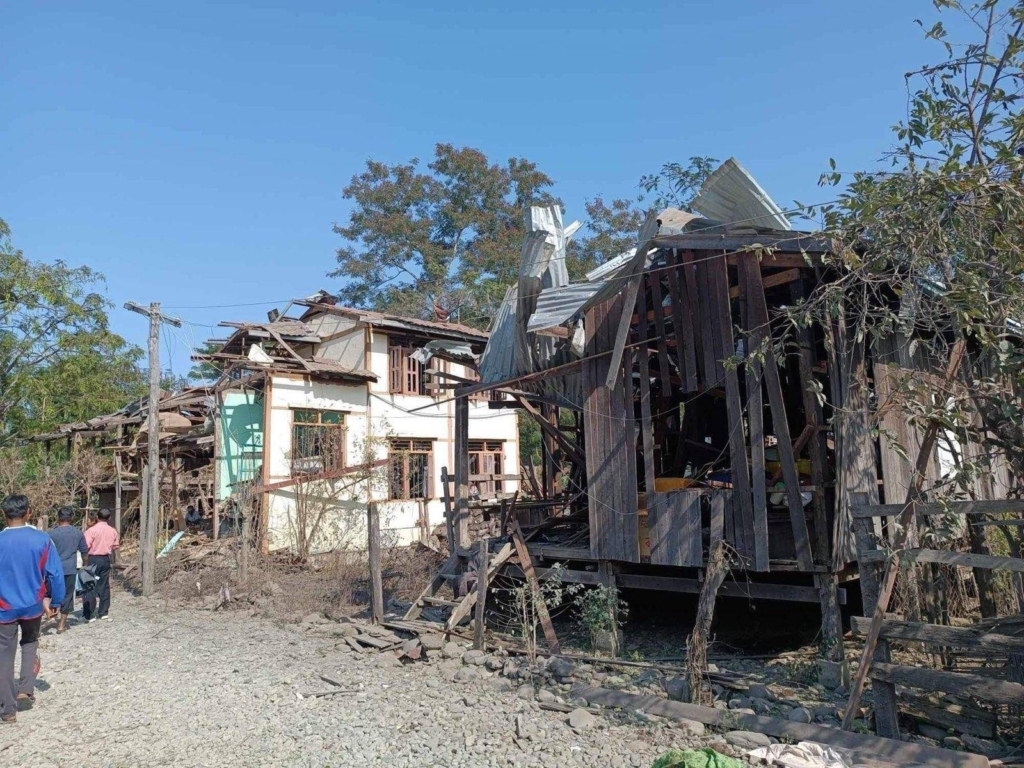
Homes in Kanan were damaged by the strikes.
Witnesses told Amnesty International of the devastation caused by the air strikes on 07 January 2024. A 56-year-old community worker said he saw a jet flying overhead as he prepared to leave his home for the nearby church. Moments later, the first strike hit approximately 200 meters from where he was standing.
He hid in his family’s rice storage shed with his wife and two children, just before another strike hit. Around 15 minutes later, he went to assist the injured and collect the bodies of the dead, which he described as “distressing”. Amnesty International reviewed photographs of the aftermath of the strike, which showed that one of the victim’s bodies had been dismembered, and that others had suffered catastrophic head injuries, also as described by witnesses.
A 68-year-old man, who was inside the church when the first bomb struck, said: “We only knew about it when the bomb fell. We didn’t hear the plane. We were singing inside the church when it happened. The church’s ceiling collapsed and windows were broken, so people inside the church fled outside.”
A 43-year-old market vendor, who was struck on the head by falling debris as he attempted to leave the church, told Amnesty International the second strike hit people who were running for their lives. He said: “Everyone was scared and fleeing and trying to get home, and the second air strike hit at that moment. There is a road behind the church, and it hit the people who were running home.”
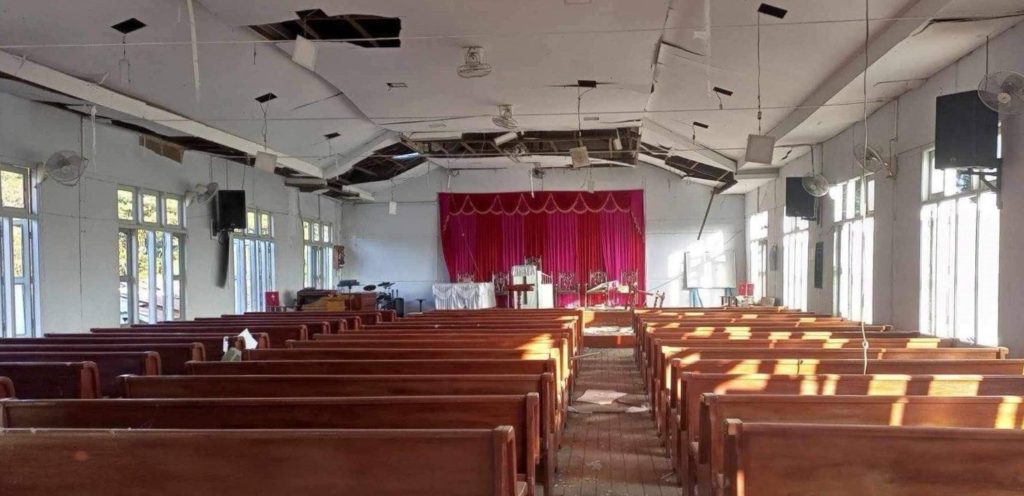
Pictures showed the damage caused to the interior of the church by the air strikes.
A 40-year-old man said the traumatized community remained on constant alert fearing further attacks. He said: “Even when we hear the sound of a motorbike, we are frightened thinking of a plane coming. We can’t sleep when we think about what happened… [The attack] has left emotional scars. We can’t go to church.”
The damage caused, as well as fear of further attacks, forced the majority of villagers to flee, seeking refuge in nearby villages, farms and forests, or across the border with India. Many of those displaced are relying on support from relatives, local religious and charity groups, and host communities to survive.
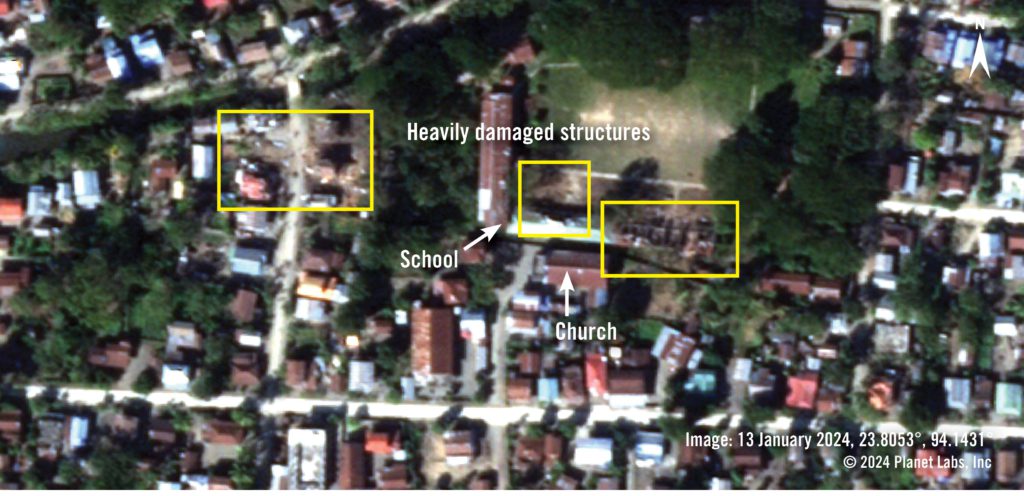
Satellite imagery showed damaged caused to the church, school and surrounding areas.
Background
Since the February 2021 coup, Myanmar has experienced a severe escalation of human rights violations.
Amnesty International’s May 2022 report, ‘Bullets rained from the sky’: War crimes and displacement in eastern Myanmar, found Myanmar’s military had subjected civilians to collective punishment via widespread aerial and ground attacks, arbitrary detentions, torture, extrajudicial executions and the systematic looting and burning of villages.
An August 2022 report, 15 days felt like 15 years: Torture in detention since the Myanmar coup, documented torture and other ill-treatment when Myanmar’s military interrogated and detained individuals suspected of being involved in protests.
A November 2022 report, Deadly Cargo: Exposing the Supply Chain that Fuels War Crimes in Myanmar, called for a suspension of the supply of aviation fuel to prevent the military from carrying out further unlawful air strikes.
Amnesty International also documented an air strike on an internally displaced persons camp in Kachin State 09 October 2023, which killed at least 28 civilians, including children.

